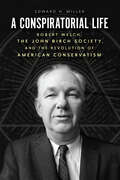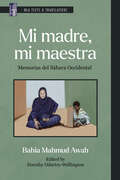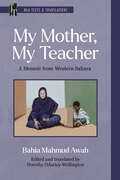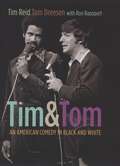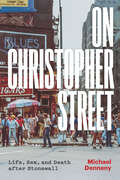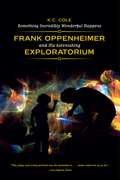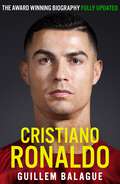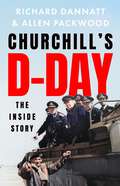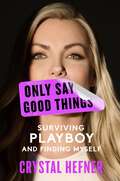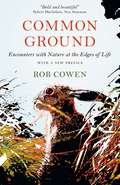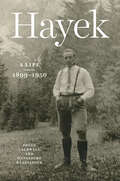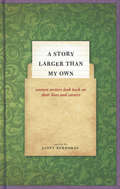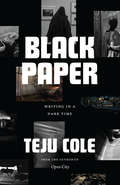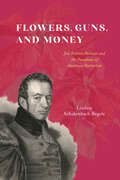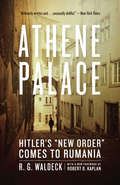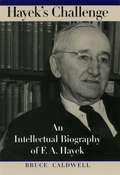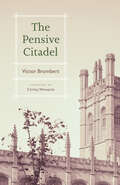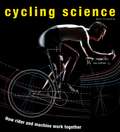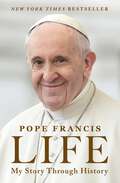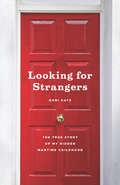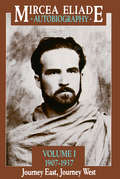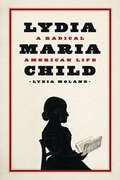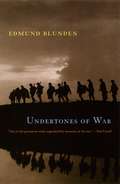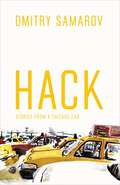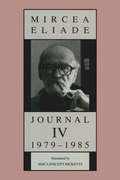- Table View
- List View
A Conspiratorial Life: Robert Welch, the John Birch Society, and the Revolution of American Conservatism
by Edward H. MillerThe first full-scale biography of Robert Welch, who founded the John Birch Society and planted some of modern conservatism’s most insidious seeds. Though you may not know his name, Robert Welch (1899-1985)—founder of the John Birch Society—is easily one of the most significant architects of our current political moment. In A Conspiratorial Life, the first full-scale biography of Welch, Edward H. Miller delves deep into the life of an overlooked figure whose ideas nevertheless reshaped the American right. A child prodigy who entered college at age 12, Welch became an unlikely candy magnate, founding the company that created Sugar Daddies, Junior Mints, and other famed confections. In 1958, he funneled his wealth into establishing the organization that would define his legacy and change the face of American politics: the John Birch Society. Though the group’s paranoiac right-wing nativism was dismissed by conservative thinkers like William F. Buckley, its ideas gradually moved from the far-right fringe into the mainstream. By exploring the development of Welch’s political worldview, A Conspiratorial Life shows how the John Birch Society’s rabid libertarianism—and its highly effective grassroots networking—became a profound, yet often ignored or derided influence on the modern Republican Party. Miller convincingly connects the accusatory conservatism of the midcentury John Birch Society to the inflammatory rhetoric of the Tea Party, the Trump administration, Q, and more. As this book makes clear, whether or not you know his name or what he accomplished, it’s hard to deny that we’re living in Robert Welch’s America.
Mi madre, mi maestra: Memorias del Sáhara Occidental (MLA Texts and Translations #43)
by null Bahia Mahmud AwahSeparated from his family in the aftermath of the failed decolonization process in Western Sahara, Bahia Mahmud Awah was sustained by recollections of his mother. In this memoir, he describes her sacrifices, her optimism, and her deep love. His family's experiences exemplify the larger story of loss and displacement in the region even as his story shows how shared memories can nourish community and culture across generations, even in exile. Incorporating poetry in Hassaniya, the traditional Saharawi language, the work highlights the role of language in shaping identity and resisting colonialism.First published in 2011 as La maestra que me enseñó en una tabla de madera (The Woman Who Taught Me on a Wooden Slate), this edition includes a new epilogue by the author featuring further remembrances of his mother and examples of her poetry.
My Mother, My Teacher: A Memoir from Western Sahara (MLA Texts and Translations)
by null Bahia Mahmud AwahSeparated from his family in the aftermath of the failed decolonization process in Western Sahara, Bahia Mahmud Awah was sustained by recollections of his mother. In this memoir, he describes her sacrifices, her optimism, and her deep love. His family's experiences exemplify the larger story of loss and displacement in the region even as his story shows how shared memories can nourish community and culture across generations, even in exile. Incorporating poetry in Hassaniya, the traditional Saharawi language, the work highlights the role of language in shaping identity and resisting colonialism.First published in 2011 as La maestra que me enseñó en una tabla de madera (The Woman Who Taught Me on a Wooden Slate), this edition includes the first complete English translation and a new epilogue by the author featuring further remembrances of his mother and examples of her poetry.
Tim & Tom: An American Comedy in Black and White (None Ser.)
by Tim Reid Tom Dreesen Ron RapoportAs the heady promise of the 1960s sagged under the weight of widespread violence, rioting, and racial unrest, two young men--one black and one white--took to stages across the nation to help Americans confront their racial divide: by laughing at it.Tim and Tom tells the story of that pioneering duo, the first interracial comedy team in the history of show business--and the last. Tim Reid and Tom Dreesen polished their act in the nightclubs of Chicago, then took it on the road, not only in the North, but in the still-simmering South as well, developing routines that even today remain surprisingly frank--and remarkably funny--about race. Most nights, the shock of seeing an integrated comedy team quickly dissipated in uproarious laughter, but on some occasions the audience’s confusion and discomfort led to racist heckling, threats, and even violence. Though Tim and Tom perpetually seemed on the verge of making it big throughout their five years together, they grudgingly came to realize that they were ahead of their time: America was not yet ready to laugh at its own failed promise. Eventually, the grind of the road took its toll, as bitter arguments led to an acrimonious breakup. But the underlying bond of friendship Reid and Dreesen had forged with each groundbreaking joke has endured for decades, while their solo careers delivered the success that had eluded them as a team. By turns revealing, shocking, and riotously funny, Tim and Tom unearths a largely forgotten chapter in the history of comedy.
On Christopher Street: Life, Sex, and Death after Stonewall
by Michael DennenyThrough the eyes of publishing icon Michael Denneny, this cultural autobiography traces the evolution of the US’s queer community in the three decades post-Stonewall. The Stonewall Riots of 1969 and the AIDS crisis of the 1980s have been captured in minute detail, and rightly memorialized in books, on tv, and in film as pivotal and powerful moments in queer history. Yet what about the moments in between—the tumultuous decade post-Stonewall when the queer community’s vitality and creativity exploded across the country, even as the AIDS crisis emerged? Michael Denneny was there for it all. As a founder and editor of the wildly influential magazine Christopher Street and later as the first openly gay editor at a major publishing house, Denneny critically shaped publishing around gay subjects in the 1970s and beyond. At St. Martin’s Press, he acquired a slew of landmark titles by gay authors—many for his groundbreaking Stonewall Inn Editions—propelling queer voices into the mainstream cultural conversation. On Christopher Street is Denneny’s time machine, going back to that heady period to lay out the unfolding geographies and storylines of gay lives and capturing the raw immediacy of his and his contemporaries’ daily lives as gay people in America. Through forty-one micro-chapters, he uses his journal writings, articles, interviews, and more from the 1970s and ‘80s to illuminate the twists and turns of a period of incomparable cultural ferment. One of the few surviving voices of his generation, Denneny transports us back in time to share those vibrant in-between moments in gay lives—the joy, sorrow, ecstasy, and energy—across three decades of queer history.
Something Incredibly Wonderful Happens: Frank Oppenheimer and His Astonishing Exploratorium
by K.C. ColeHow do we reclaim our innate enchantment with the world? And how can we turn our natural curiosity into a deep, abiding love for knowledge? Frank Oppenheimer, the younger brother of the physicist J. Robert Oppenheimer, was captivated by these questions, and used his own intellectual inquisitiveness to found the Exploratorium, a powerfully influential museum of human awareness in San Francisco, that encourages play, creativity, and discovery—all in the name of understanding. In this elegant biography, K. C. Cole investigates the man behind the museum with sharp insight and deep sympathy. The Oppenheimers were a family with great wealth and education, and Frank, like his older brother, pursued a career in physics. But while Robert was unceasingly ambitious, and eventually came to be known for his work on the atomic bomb, Frank’s path as a scientist was much less conventional. His brief fling with the Communist Party cost him his position at the University of Minnesota, and he subsequently spent a decade ranching in Colorado before returning to teaching. Once back in the lab, however, Frank found himself moved to create something to make the world meaningful after the bombing of Hiroshima and Nagasaki. He was inspired by European science museums, and he developed a dream of teaching Americans about science through participatory museums. Thus was born the magical world of the Exploratorium, forever revolutionizing not only the way we experience museums, but also science education for years to come. Cole has brought this charismatic and dynamic figure to life with vibrant prose and rich insight into Oppenheimer as both a scientist and an individual.
Cristiano Ronaldo: The Award-Winning Biography (Guillem Balague's Books)
by Guillem BalagueThe definitive award-winning biography of Cristiano Ronaldo - fully updated to include the 2022 World Cup, Ronaldo's explosive exit from Manchester United and his record-breaking transfer to Al-NassrAs the Qatar World Cup opened to worldwide jubilation, Cristiano Ronaldo's second spell at Manchester United reached an abrupt conclusion. It was not to be the fairy tale ending to a glittering career. Instead, over the two seasons, it had snowballed into a toxic standoff between himself, the board and newly appointed manager, Erik ten Hag. The Theatre's dream was over. On 22 November 2022, Ronaldo's contract was terminated.In this compelling account, Guillem Balagué draws on impeccable sources, first-hand interviews and unprecedented access, taking us on a journey from Madeira to Manchester, and onto Spain, Italy and Saudi Arabia. From Ronaldo's tutelage under Sir Alex Ferguson to becoming the biggest galáctico of them all at Real Madrid, and captaining Portugal to the first silverware in their history at the UEFA Euro 2016, Guillem chronicles Ronaldo's career in its entirety. This is nothing less than the definitive portrait of a true icon of modern football, who has reached the very heights of the beautiful game and cemented his place as one of the greatest players of all time.
Churchill's D-Day: The Inside Story
by Richard Dannatt Allen Packwood'This is a fascinating book which re-examines events that liberated and thus shaped the future of Europe.' Lord Soames, Winston Churchill's grandson 'An engrossing delight . . . Dannatt and Packwood have produced an account of Churchill's D-Day worthy of both the Great Man and the colossal event . . . Readers will greedily want more in the future from this superb writing partnership.' International Churchill Society 'Do you realise that by the time you wake up in the morning twenty thousand men may have been killed?'- Winston Churchill to Clementine Churchill, 5 June 1944D-Day is rightly celebrated as a great triumph and a major turning point in the Second World War. But as Churchill knew, large-scale land and sea operations were fraught with danger and victory was not guaranteed. What would have happened if D-Day had failed? Would the outcome of the war have been different? And how much of its success was down to the leadership of one man?Churchill's D-Day plunges us back in time to this knife-edge moment to witness events as they unfolded. Through documents and letters from the Churchill Archives Centre in Cambridge, we get a vivid sense of the tremendous risks involved in the planning and execution of Operation Overlord, the largest land, sea and air operation ever staged. This authoritative new history combines the analysis of General Richard Dannatt, one of the most respected of Britain's contemporary military leaders, with the insight of Allen Packwood, one of the world's foremost Churchill experts. Together they reveal the intricacies of Churchill's thinking, the strength of his instrumental leadership, his precision planning and impeccable timing.Original, illuminating and gripping, Churchill's D-Day demonstrates how the road to victory led directly from the beaches of Normandy to the streets of Berlin, ultimately securing our freedom.
Only Say Good Things: Surviving Playboy and Finding Myself
by Crystal HefnerAN INSTANT NEW YORK TIMES BESTSELLER A JANUARY 2024 APPLE BOOKS STAFF PICK AND AUDIBLE EDITORS SELECT NAMED A BEST BOOK TO READ THIS JANUARY BY THE GLOSS A raw and unflinching look at the objectification and misogyny of the Playboy mansion, a woman&’s stolen young adulthood and her journey to self-acceptance, and a rare look inside Hugh Hefner&’s final days. At just twenty-one years old, Crystal Harris&’ life changed forever when she attended a party at the notorious Playboy mansion. Picked out of the crowd by Hugh Hefner, she became one of his infamous &“girlfriends,&” attending glamorous Hollywood parties and traveling the world. Yet this seemingly alluring lifestyle had a dark side. Hef controlled his girlfriends with strict rules regarding everything from their hair and makeup to their curfews, and Crystal was forced to compete with other women for her spot in the highly hierarchal system. Living at the mansion, she felt more like a fixture than a resident. She quickly rose to the top, but being Hef&’s number one girlfriend came at the cost of Crystal&’s identity outside her role in the Playboy universe. Her fate seemed sealed when Hef surprised her with a marriage proposal she could not imagine refusing. But as Crystal Hefner, she grew increasingly restless to understand who she truly was away from what she saw as Playboy&’s toxic culture. In ONLY SAY GOOD THINGS, Crystal offers a vulnerable and clear-eyed look at how her experience with Hugh Hefner catalyzed her transformative journey from someone who prized external validation over all else to a person who finally recognizes her true worth. This candid memoir provides a fascinating look behind the scenes at a powerful cultural icon and brand, and an equally empowering perspective on hard-won lessons about who we allow to determine our value.
Common Ground: Encounters with Nature at the Edges of Life
by Rob CowenAll too often, we think of nature as something distinct from ourselves, something to go and see, a place that’s separate from the ordinary modern world in which we live and work. But if we take the time to look, we soon find that’s not how nature works. Even in our parceled-out, paved-over urban environs, nature is all around us; it is in us. It is us. That’s what Rob Cowen discovered after moving to a new home in northern England. After ten years in London he was suddenly adrift, searching for a sense of connection. He found himself drawn to a square-mile patch of waste ground at the edge of town. Scrappy, weed-filled, this heart-shaped tangle of land was the very definition of overlooked—a thoroughly in-between place that capitalism no longer had any use for, leaving nature to take its course. Wandering its meadows, woods, hedges, and fields, Cowen found it was also a magical, mysterious place, haunted and haunting, abandoned but wildly alive—and he fell in fascinated love. Common Ground is a true account of that place and Cowen’s transformative journey through its layers and lives, but it’s much more too. As the land’s stories intertwine with events in his own life—and he learns he is to become a father for the first time—the divisions between human and nature begin to blur and shift. The place turns out to be a mirror, revealing what we are, what we’re not and how those two things are ultimately inseparable. This is a book about discovering a new world, a forgotten world on the fringes of our daily lives, and the richness that comes from uncovering the stories and lives—animal and human—contained within. It is an unforgettable piece of nature writing, part of a brilliant tradition that stretches from Gilbert White to Robert Macfarlane and Helen Macdonald. “I am dreaming of the edge-land again,” Cowen writes. Read Common Ground, and you, too, will be dreaming of the spaces in between, and what—including us—thrives there.
Hayek: A Life, 1899–1950 (The\collected Works Of F. A. Hayek Ser.)
by Bruce Caldwell Hansjoerg KlausingerA 2022 Economist Best Book of the Year. The definitive account of the distinguished economist’s formative years. Few twentieth-century figures have been lionized and vilified in such equal measure as Friedrich Hayek—economist, social theorist, leader of the Austrian school of economics, and champion of classical liberalism. Hayek’s erudite arguments in support of individualism and the market economy have attracted a devout following, including many at the levers of power in business and government. Critics, meanwhile, cast Hayek as the intellectual forefather of “neoliberalism” and of all the evils they associate with that pernicious doctrine. In Hayek: A Life, historians of economics Bruce Caldwell and Hansjörg Klausinger draw on never-before-seen archival and family material to produce an authoritative account of the influential economist’s first five decades. This includes portrayals of his early career in Vienna; his relationships in London and Cambridge; his family disputes; and definitive accounts of the creation of The Road to Serfdom and of the founding meeting of the Mont Pèlerin Society. A landmark work of history and biography, Hayek: A Life is a major contribution both to our cultural accounting of a towering figure and to intellectual history itself.
A Story Larger than My Own: Women Writers Look Back on Their Lives and Careers
by Janet BurrowayIn 1955, Maxine Kumin submitted a poem to the Saturday Evening Post. “Lines on a Half-Painted House” made it into the magazine—but not before Kumin was asked to produce, via her husband’s employer, verification that the poem was her original work. Kumin, who went on to win the Pulitzer Prize for poetry, was part of a groundbreaking generation of women writers who came of age during the midcentury feminist movement. By challenging the status quo and ultimately finding success for themselves, they paved the way for future generations of writers. In A Story Larger than My Own, Janet Burroway brings together Kumin, Julia Alvarez, Jane Smiley, Erica Jong, and fifteen other accomplished women of this generation to reflect on their writing lives. The essays and poems featured in this collection illustrate that even writers who achieve critical and commercial success experience a familiar pattern of highs and lows over the course of their careers. Along with success comes the pressure to sustain it, as well as a constant search for subject matter, all too frequent crises of confidence, the challenges of a changing publishing scene, and the difficulty of combining writing with the ordinary stuff of life—family, marriage, jobs. The contributors, all now over the age of sixty, also confront the effects of aging, with its paradoxical duality of new limitations and newfound freedom. Taken together, these stories offer advice from experience to writers at all stages of their careers and serve as a collective memoir of a truly remarkable generation of women.
Black Paper: Writing in a Dark Time (Berlin Family Lectures)
by Teju ColeA profound book of essays from a celebrated master of the form. “Darkness is not empty,” writes Teju Cole in Black Paper, a book that meditates on what it means to sustain our humanity—and witness the humanity of others—in a time of darkness. One of the most celebrated essayists of his generation, Cole here plays variations on the essay form, modeling ways to attend to experience—not just to take in but to think critically about what we sense and what we don’t. Wide-ranging but thematically unified, the essays address ethical questions about what it means to be human and what it means to bear witness, recognizing how our individual present is informed by a collective past. Cole’s writings in Black Paper approach the fractured moment of our history through a constellation of interrelated concerns: confrontation with unsettling art, elegies both public and private, the defense of writing in a time of political upheaval, the role of the color black in the visual arts, the use of shadow in photography, and the links between literature and activism. Throughout, Cole gives us intriguing new ways of thinking about blackness and its numerous connotations. As he describes the carbon-copy process in his epilogue: “Writing on the top white sheet would transfer the carbon from the black paper onto the bottom white sheet. Black transported the meaning.”
Flowers, Guns, and Money: Joel Roberts Poinsett and the Paradoxes of American Patriotism (American Beginnings, 1500-1900 Ser.)
by Lindsay Schakenbach RegeleA fascinating historical account of a largely forgotten statesman, who pioneered a form of patriotism that left an indelible mark on the early United States. Joel Roberts Poinsett’s (1779–1851) brand of self-interested patriotism illuminates the paradoxes of the antebellum United States. He was a South Carolina investor and enslaver, a confidant of Andrew Jackson, and a secret agent in South America who fought surreptitiously in Chile’s War for Independence. He was an ambitious Congressman and Secretary of War who oversaw the ignominy of the Trail of Tears and orchestrated America’s longest and costliest war against Native Americans, yet also helped found the Smithsonian. In addition, he was a naturalist, after whom the poinsettia—which he appropriated while he was serving as the first US ambassador to Mexico—is now named. As Lindsay Schakenbach Regele shows in Flowers, Guns, and Money, Poinsett personified a type of patriotism that emerged following the American Revolution, one in which statesmen served the nation by serving themselves, securing economic prosperity and military security while often prioritizing their own ambitions and financial interests. Whether waging war, opposing states’ rights yet supporting slavery, or pushing for agricultural and infrastructural improvements in his native South Carolina, Poinsett consistently acted in his own self-interest. By examining the man and his actions, Schakenbach Regele reveals an America defined by opportunity and violence, freedom and slavery, and nationalism and self-interest.
Athene Palace: Hitler's "New Order" Comes to Rumania
by R.G. WaldeckOn the day that Paris fell to the Nazis, R. G. Waldeck was checking into the swankiest hotel in Bucharest, the Athene Palace. A cosmopolitan center during the war, the hotel was populated by Italian and German oilmen hoping to secure new business opportunities in Romania, international spies cloaked in fake identities, and Nazi officers whom Waldeck discovered to be intelligent but utterly bloodless. A German Jew and a reporter for Newsweek, Waldeck became a close observer of the Nazi invasion. As King Carol first tried to placate the Nazis, then abdicated the throne in favor of his son, Waldeck was dressing for dinners with diplomats and cozying up to Nazi officers to get insight and information. From her unique vantage, she watched as Romania, a country with a pro-totalitarian elite and a deep strain of anti-Semitism, suffered civil unrest, a German invasion, and an earthquake, before turning against the Nazis. A striking combination of social intimacy and disinterest political analysis, Athene Palace evokes the elegance and excitement of the dynamic international community in Bucharest before the world had comes to grips with the horrors of war and genocide. Waldeck’s account strikingly presents the finely wrought surface of dinner parties, polite discourse, and charisma, while recognizing the undercurrents of violence and greed that ran through the denizens of Athene Palace.
Hayek's Challenge: An Intellectual Biography of F.A. Hayek
by Bruce CaldwellFriedrich A. Hayek is regarded as one of the preeminent economic theorists of the twentieth century, as much for his work outside of economics as for his work within it. During a career spanning several decades, he made contributions in fields as diverse as psychology, political philosophy, the history of ideas, and the methodology of the social sciences. Bruce Caldwell—editor of The Collected Works of F. A. Hayek—understands Hayek's thought like few others, and with this book he offers us the first full intellectual biography of this pivotal social theorist. Caldwell begins by providing the necessary background for understanding Hayek's thought, tracing the emergence, in fin-de-siècle Vienna, of the Austrian school of economics—a distinctive analysis forged in the midst of contending schools of thought. In the second part of the book, Caldwell follows the path by which Hayek, beginning from the standard Austrian assumptions, gradually developed his unique perspective on not only economics but a broad range of social phenomena. In the third part, Caldwell offers both an assessment of Hayek's arguments and, in an epilogue, an insightful estimation of how Hayek's insights can help us to clarify and reexamine changes in the field of economics during the twentieth century. As Hayek's ideas matured, he became increasingly critical of developments within mainstream economics: his works grew increasingly contrarian and evolved in striking—and sometimes seemingly contradictory—ways. Caldwell is ideally suited to explain the complex evolution of Hayek's thought, and his analysis here is nothing short of brilliant, impressively situating Hayek in a broader intellectual context, unpacking the often difficult turns in his thinking, and showing how his economic ideas came to inform his ideas on the other social sciences.Hayek's Challenge will be received as one of the most important works published on this thinker in recent decades.
The Pensive Citadel
by Victor BrombertA reflective volume of essays on literature and literary study from a storied professor. In The Pensive Citadel, Victor Brombert looks back on a lifetime of learning within a university world greatly altered since he entered Yale on the GI Bill in the 1940s. Yet for all that has changed, much of Brombert’s long experience as a reader and teacher is richly familiar: the rewards of rereading, the joy of learning from students, and most of all the insight to be found in engaging works of literature. The essays gathered here range from meditations on laughter and jealousy to new appreciations of Brombert’s lifelong companions Shakespeare, Montaigne, Voltaire, and Stendhal. A veteran of D-day and the Battle of the Bulge who witnessed history’s worst nightmares firsthand, Brombert nevertheless approaches literature with a lightness of spirit, making the case for intellectual mobility and openness to change. The Pensive Citadel is a celebration of a life lived in literary study, and of what can be learned from attending to the works that form one’s cultural heritage.
Cycling Science: How Rider and Machine Work Together
by Max GlaskinEvery July hundreds of thousands flock to the Champs-Élysées in Paris—and millions more to their televisions and computers—to witness the dramatic conclusion of the grueling three weeks of the Tour de France. There is no better measure of the worldwide love of the bicycle. But of the 1.2 billion cyclists traversing the world’s roadways and trails, few of us take the time to consider the science behind the sport. The simple process of getting about on two wheels brings us in touch with a wealth of fascinating science, and here journalist Max Glaskin investigates the scientific wonders that keep cyclists in their saddles. Cycling Science tours readers through a wide variety of topics, from tire rolling resistance and the difference between yield strength and ultimate strength, to the importance of aerodynamics and the impact that shaved legs have on speed. Each chapter explores a different subject—fundamentals, strength and stability, materials, power, aerodynamics, and the human factor—and is organized around a series of questions: What is the ideal frame shape? What is the biggest source of drag? What keeps a bicycle from falling over? How much power can a cyclist produce? Which muscles does cycling use? Each question is examined with the aid of explanatory diagrams and illustrations, and the book can be used to search for particular topics, or read through for a comprehensive overview of how machine and rider work together. Athletes have much to gain from understanding the science of their sports, and Cycling Science will be a must-read for cyclists of all stripes—professionals, recreational riders, and anyone seeking to enhance their enjoyment of cycling.
Life: My Story Through History
by Pope FrancisFor the first time, Pope Francis tells the story of his life as he looks back on the momentous world events that have changed history—from his earliest years during the outbreak of World War II in 1939 to the turmoil of today. An extraordinary personal and historical journey, Life is the story of a man and a world in dramatic change. Pope Francis recalls his life through memories and observations of the most significant occurrences of the past eight decades, from the Holocaust to the fall of the Berlin Wall, Videla’s coup in Argentina to the moon landing in 1969, and even the 1986 World Cup in which Maradona scored the unforgettable “hand of God” goal.Here are the frank assessments and intimate insights of a pastor reflecting on the Nazi extermination of the Jews, the atomic bombings of Hiroshima and Nagasaki, the 2001 terrorist attack on America and the collapse of the Twin Towers, the great economic recession of 2008, the Covid-19 pandemic, the retirement of Pope Benedict XVI, and the subsequent conclave that elected him Pontiff. The “pope callejero” recounts these world-changing moments with the candor and compassion that distinguishes him, and offers important messages on major crises confronting us now, including social inequalities, climate change, international war, atomic weapons, racial discrimination, and the battles over social and cultural issues.Translated from the Italian by Aubrey Botsford
Looking for Strangers: The True Story of My Hidden Wartime Childhood
by Dori KatzDori Katz is a Jewish Holocaust survivor who thought that her lost memories of her childhood years in Belgium were irrecoverable. But after a chance viewing of a documentary about hidden children in German-occupied Belgium, she realized that she might, in fact, be able to unearth those years. Looking for Strangers is the deeply honest record of her attempt to do so, a detective story that unfolds through one of the most horrifying periods in history in an attempt to understand one’s place within it.In alternating chapters, Katz journeys into multiple pasts, setting details from her mother’s stories that have captivated her throughout her life alongside an account of her own return to Belgium forty years later—against her mother’s urgings—in search of greater clarity. She reconnects her sharp but fragmented memories: being sent by her mother in 1943, at the age of three, to live with a Catholic family under a Christian identity; then being given up, inexplicably, to an orphanage in the years immediately following the war. Only after that, amid postwar confusion, was she able to reconnect with her mother. Following this trail through Belgium to her past places of hiding, Katz eventually finds herself in San Francisco, speaking with a man who claimed to have known her father in Auschwitz—and thus known his end. Weighing many other stories from the people she meets along her way—all of whom seem to hold something back—she attempts to stitch thread after thread into a unified truth, to understand the countless motivations and circumstances that determined her remarkable life.A story at once about self-discovery, the transformation of memory, a fraught mother-daughter relationship, and the oppression of millions, Looking for Strangers is a book of both historical insight and imaginative grasp. It is a book in which the past, through its very mystery, becomes alive, immediate—of the most urgent importance.
Mircea Eliade: Journey East, Journey West, 1907–1937
by Mircea Eliade"Here finally are Eliade's memoirs of the first thirty years of his life in Mac Linscott Rickett's crisp and lucid English translation. They present a fascinating account of the early development of a Renaissance talent, expressed in everything from daily and periodical journalism, realistic and fantastic fiction, and general nonfiction works to distinguished contributions to the history of religions. Autobiography follows an apparently amazingly candid report of this remarkable man's progression from a mischievous street urchin and literary prodigy, through his various love affairs, a decisive and traumatic Indian sojourn, and active, brilliant participation in pre-World War II Romanian cultural life."—Seymour Cain, Religious Studies Review
Lydia Maria Child: A Radical American Life
by Lydia MolandNow in paperback, a compelling biography of Lydia Maria Child, one of nineteenth-century America’s most courageous abolitionists. By 1830, Lydia Maria Child had established herself as something almost unheard of in the American nineteenth century: a beloved and self-sufficient female author. Best known today for the immortal poem “Over the River and through the Wood,” Child had become famous at an early age for spunky self-help books and charming children’s stories. But in 1833, Child shocked her readers by publishing a scathing book-length argument against slavery in the United States—a book so radical in its commitment to abolition that friends abandoned her, patrons ostracized her, and her book sales plummeted. Yet Child soon drew untold numbers to the abolitionist cause, becoming one of the foremost authors and activists of her generation. Lydia Maria Child: A Radical American Life tells the story of what brought Child to this moment and the extraordinary life she lived in response. Through Child’s example, philosopher Lydia Moland asks questions as pressing and personal in our time as they were in Child’s: What does it mean to change your life when the moral future of your country is at stake? When confronted by sanctioned evil and systematic injustice, how should a citizen live? Child’s lifetime of bravery, conviction, humility, and determination provides a wealth of spirited guidance for political engagement today.
Undertones of War
by Edmund Blunden“I took my road with no little pride of fear; one morning I feared very sharply, as I saw what looked like a rising shroud over a wooden cross in the clustering mist. Horror! But on a closer study I realized that the apparition was only a flannel gas helmet. . . . What an age since 1914!” In Undertones of War, one of the finest autobiographies to come out of World War I, the acclaimed poet Edmund Blunden records his devastating experiences in combat. After enlisting at the age of twenty, he took part in the disastrous battles at the Somme, Ypres, and Passchendaele, describing them as “murder, not only to the troops but to their singing faiths and hopes.” All the horrors of trench warfare, all the absurdity and feeble attempts to make sense of the fighting, all the strangeness of observing war as a writer—of being simultaneously soldier and poet—pervade Blunden’s memoir. In steely-eyed prose as richly allusive as any poetry, he tells of the endurance and despair found among the men of his battalion, including the harrowing acts of bravery that won him the Military Cross. Now back in print for American readers, the volume includes a selection of Blunden’s war poems that unflinchingly juxtapose death in the trenches with the beauty of Flanders’s fields. Undertones of War deserves a place on anyone’s bookshelf between Siegfried Sassoon’s poetry and Robert Graves’s Goodbye to All That.
Hack: Stories from a Chicago Cab (Chicago Visions And Revisions Ser.)
by Dmitry SamarovCabdrivers and their yellow taxis are as much a part of the cityscape as the high-rise buildings and the subway. We hail them without thought after a wearying day at the office or an exuberant night on the town. And, undoubtedly, taxi drivers have stories to tell—of farcical local politics, of colorful passengers, of changing neighborhoods and clandestine shortcuts. No one knows a city’s streets—and thus its heart—better than its cabdrivers. And from behind the wheel of his taxi, Dmitry Samarov has seen more of Chicago than most Chicagoans will hope to experience in a lifetime. An artist and painter trained at the School of the Art Institute of Chicago, Samarov began driving a cab in 1993 to make ends meet, and he’s been working as a taxi driver ever since. In Hack: Stories from a Chicago Cab, he recounts tales that will delight, surprise, and sometimes shock the most seasoned urbanite. We follow Samarov through the rhythms of a typical week, as he waits hours at the garage to pick up a shift, ferries comically drunken passengers between bars, delivers prostitutes to their johns, and inadvertently observes drug deals. There are long waits with other cabbies at O’Hare, vivid portraits of street corners and their regular denizens, amorous Cubs fans celebrating after a game at Wrigley Field, and customers who are pleasantly surprised that Samarov is white—and tell him so. Throughout, Samarov’s own drawings—of his fares, of the taxi garage, and of a variety of Chicago street scenes—accompany his stories. In the grand tradition of Nelson Algren, Saul Bellow, Mike Royko, and Studs Terkel, Dmitry Samarov has rendered an entertaining, poignant, and unforgettable vision of Chicago and its people.
Journal IV: 1979–1985
by Mircea EliadeJournal IV is the first publication, in a translation from the Romanian manuscript, of the journal that Mircea Eliade kept during the last seven years of his life. In this period, Eliade is ensconced as a famous scholar—his works are being translated into many languages and books about him arrive regularly in the mail. His encounters with scholars of like repute are recorded in the journal; after a party in Paris, Eliade shares a taxi with Claude Lévi-Strauss and inadvertently makes off with his raincoat. Running like a fault line through the peak of his success, however, is Eliade's painful awareness of his physical decline—failing vision, arthritic hands, and continual fatigue. Again and again he repeats how little time he has to finish the projects he is working on—his autobiography, the third and fourth volumes of his History of Religious Ideas, and the duties associated with his editorship of the Encyclopedia of Religion. He poignantly recounts the sharpest blow: the disorganization and eventual destruction by fire of his personal library. Within the scope of Journal IV Eliade and his world go to ruin. What does not decline is the vivid and persistent voice of Eliade the writer, an unbreaking voice that—with death only months away—plans a reply to critics, plots out an article, and ruminates on characters to people another novella.
